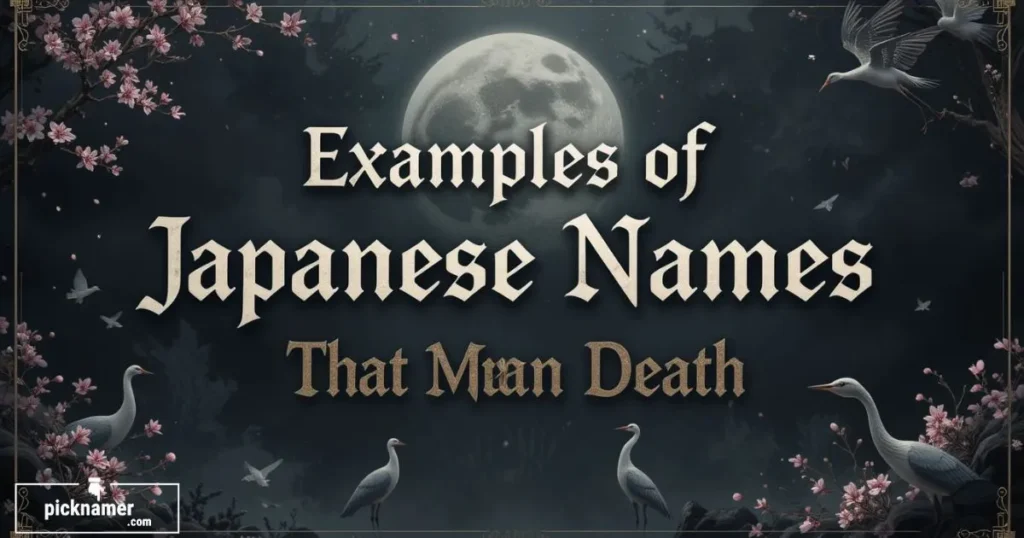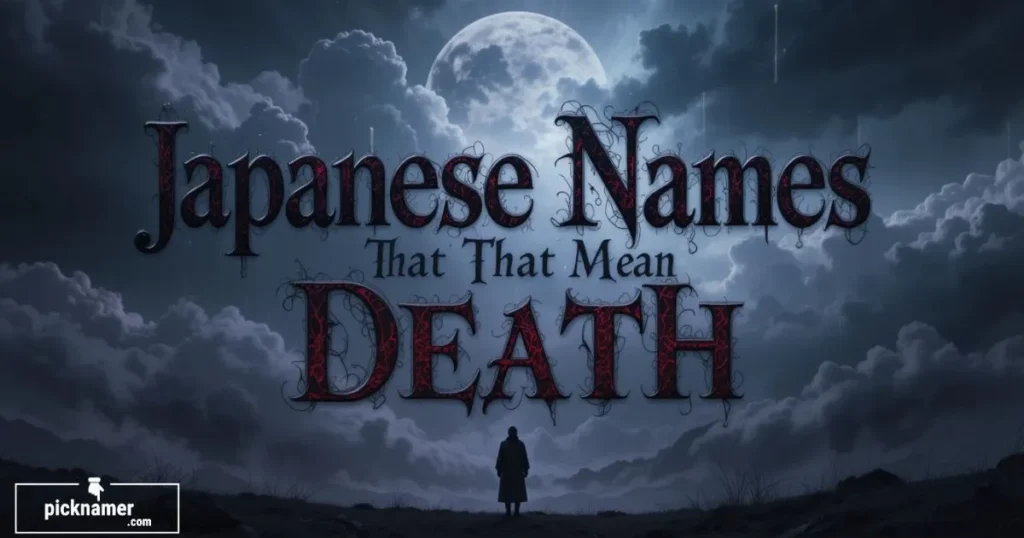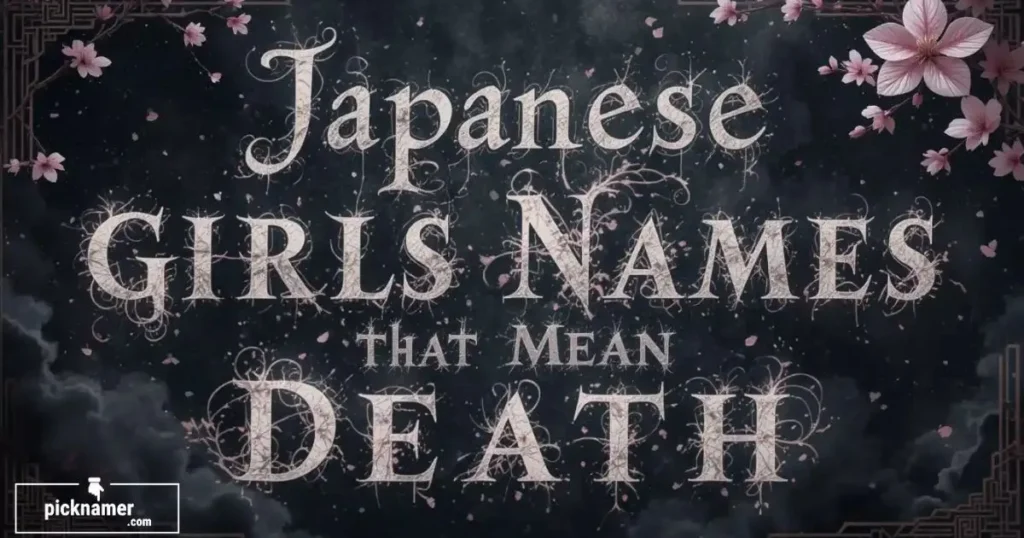Death is a taboo subject in many cultures, but in Japan, it carries a deep reverence and respect. Japanese culture embraces the cycle of life with a mix of melancholy, nostalgia, and tribute to ancestors and loved ones who have passed.
Through names rich in meaning and symbolism, the memory of the departed stays alive, weaving their legacy into the cultural tapestry.
If you’re fascinated by the intriguing nature of Japanese names tied to death, mystery, and philosophy, this list is a journey of discovery.
When you are a writer seeking profound depth, a student of language, or simply someone drawn to the poetic and philosophical undertones of names, this collection will evoke curiosity and emotion.
In Japanese culture, names are more than just identifiers; they hold history, significance, and powerful symbolism.
With influences from Kanji and Katakana, these names reveal deep meanings, often intertwined with nature, concepts of mortality, and poetic interpretations. Let’s explore the allure of these dark yet captivating names.
Examples of Japanese Names That Mean Death

- Shimei (死命) – Means “death’s fate”, symbolizing an inescapable destiny.
- Shigo (死後) – Represents “after death”, tied to the afterlife.
- Shikei (死刑) – A name with dark symbolism, meaning “death sentence”.
- Reishi (霊死) – Translates to “spirit death”, referring to lost souls.
- Meifu (冥府) – Refers to the underworld, a mystical realm of the dead.
- Sanzu (三途) – Named after the Sanzu River, a path to the afterlife.
- Shinda (死んだ) – A rare name that directly means “deceased”.
- Shikyo (死境) – Represents the “border of death”, evoking mystery.
- Enma (閻魔) – Inspired by Enma, the ruler of the underworld in Japanese beliefs.
- Kuragari (暗がり) – Symbolizes “deep darkness before death”, tied to melancholy.
- Jisei (辞世) – A poetic name linked to death poems, a part of Japanese tradition.
- Shirō (死郎) – Can mean “son of death”, depending on the kanji interpretation.
- Botan (牡丹) – A flower associated with both life and death in Japan.
- Mu (無) – Represents “nothingness”, linked to Buddhist mortality concepts.
- Shin’en (深淵) – Meaning “deep abyss”, evoking a sense of unknown fate.
- Ankou (安行) – A mythical name linked to death bringers in folklore.
- Yami no Shi (闇の死) – Means “death of darkness”, carrying a philosophical weight.
- Kuroshi (黒死) – Inspired by “black death”, a historical reference.
- Tenshi no Shi (天使の死) – “Angel of death”, a name with a poetic and dark meaning.
- Shizuka (死図花) – A symbolic name that means “death’s flower”, carrying deep philosophical undertones.
Japanese Names That Mean Death

- Shimei (死命) – Means “fatal destiny” or “death’s command.”
- Shigo (死後) – Represents “after death” or the afterlife.
- Shikei (死刑) – Symbolizes “death penalty” or ultimate fate.
- Shiho (死保) – A unique name meaning “protector of death.”
- Reishi (霊死) – Translates to “spirit death,” tied to lost souls.
- Kuroshi (黒死) – Inspired by “black death” and dark history.
- Jisei (辞世) – A poetic name linked to “death poem” traditions.
- Shizuka (死図花) – A symbolic name meaning “death’s flower.”
- Shirō (死郎) – Can mean “son of death” with its kanji.
- Botan (牡丹) – A flower linked to both life and death in Japan.
- Meifu (冥府) – Refers to the underworld or “realm of the dead.”
- Shinda (死んだ) – A rare name directly translating to “dead.”
- Shikyo (死境) – Represents the “border of death.”
- Yami no Shi (闇の死) – Meaning “death of darkness.”
- Sanzu (三途) – Refers to the river leading to the afterlife.
- Kuragari (暗がり) – Symbolizes “deep darkness before death.”
- Enma (閻魔) – Named after the Japanese ruler of the dead.
- Mu (無) – Represents “nothingness,” linked to death in Zen.
- Shin’en (深淵) – Means “deep abyss,” evoking the unknown.
- Ankou (安行) – A mythical name linked to death bringers.
Japanese Girls Names That Mean Death

- Shiho (死穂) – A poetic name meaning “death’s harvest.”
- Akumu (悪夢) – Translates to “nightmare,” tied to spirits.
- Reika (霊花) – Means “spirit flower” with a soft touch.
- Yomi (黄泉) – Inspired by the Japanese underworld.
- Mai (舞) – Connected to the dance of spirits in folklore.
- Noriko (死里子) – Can be read as “child from the land of death.”
- Kurai (暗い) – A name meaning “gloom” or “darkness.”
- Mikage (御影) – Refers to an “honored spirit’s shadow.”
- Sakura (桜) – Cherry blossoms, symbolizing fleeting life.
- Tsubaki (椿) – A flower linked to samurai death traditions.
- Utsuro (虚ろ) – Represents “emptiness” or a lost soul.
- Kanon (花音) – Means “sound of flowers,” linked to spirits.
- Shinka (心火) – Symbolizes a “burning spirit after death.”
- Hikari (光り) – Light in darkness, representing lost souls.
- Yoru (夜) – Means “night,” often tied to the afterlife.
- Aika (哀歌) – Translates to “lament song” or sorrow.
- Nozomi (望み) – A name for “hope,” even in darkness.
- Amaya (雨夜) – Means “rainy night,” often linked to spirits.
- Fumiko (文子) – A name meaning “child of literature,” referencing death poems.
- Setsuna (刹那) – A Buddhist term for a fleeting moment of life.
Japanese Boys Names That Mean Death
- Shigeru (死玄) – Meaning “deep black death.”
- Kurou (黒郎) – Symbolizing “dark son” or “son of death.”
- Reiki (霊鬼) – A name meaning “spirit demon.”
- Gekko (月光) – “Moonlight,” often linked to the afterlife.
- Hayate (疾風) – Represents “storm winds,” symbolizing swift fate.
- Shiba (死場) – A rare name meaning “death’s place.”
- Jiroshi (次郎死) – Interpreted as “second son of death.”
- Shinji (死神) – A name inspired by “death gods.”
- Kaoru (薫) – Means “fragrance,” often linked to funeral incense.
- Daisuke (大祀) – Can mean “great ritual for the dead.”
- Rikuto (陸渡) – Represents “crossing to the land of spirits.”
- Souta (蒼太) – “Deep blue,” associated with spirits.
- Tsubasa (翼) – Means “wings,” often tied to departing souls.
- Yasha (夜叉) – Inspired by fierce underworld spirits.
- Shun (瞬) – Represents the fleeting moment of life.
- Tengoku (天国) – Means “heaven,” tied to the afterlife.
- Shou (翔) – Symbolizes “soaring spirits.”
- Arata (新田) – Can symbolize “rebirth” after death.
- Genma (玄魔) – A “dark demon” name connected to spirits.
- Shouta (翔太) – Meaning “soaring beyond,” tied to souls leaving.
Related: Best Baby Names That Mean Crow And Raven
Japanese Names That Mean “Dark Angel”
- Kurotenshi (黒天使) – Directly means “black angel.”
- Yamihane (闇羽) – “Wings of darkness.”
- Tenebrism (テネブリス) – A Japanese take on “tenebris” (darkness).
- Shikigami (死神紙) – Meaning “paper spirit of death.”
- Makoto (真琴) – Represents a “truthful dark guardian.”
- Raven (レイヴン) – A mystical name associated with darkness.
- Kuron (クローン) – “Clone of darkness.”
- Akumahane (悪魔羽) – “Demon wings,” linked to fallen angels.
- Eishou (影翔) – “Shadow flight,” symbolizing dark angels.
- Kureha (呉羽) – “Deep crimson feathers.”
- Reihane (霊羽) – “Spirit wings.”
- Tenshiya (天使夜) – “Angel of the night.”
- Yamiko (闇子) – “Child of darkness.”
- Kagetsu (影月) – “Shadow moon,” an ethereal name.
- Noctis (ノクティス) – Inspired by “Nocturnal.”
- Shinigami (死神) – “Death god,” tied to dark spirits.
- Kurohoshi (黒星) – “Dark star,” representing a fallen soul.
- Abyssu (アビス) – Derived from “Abyss.”
- Fushichou (不死鳥) – “Immortal bird,” an angelic name.
- Luciela (ルシエラ) – A Japanese-inspired take on “Lucifer.”
Japanese Names That Mean “Deadly”
- Shiha (死刃) – “Death blade.”
- Shinsei (神性) – “Divine death.”
- Kuragami (暗神) – “Dark god.”
- Akuro (悪路) – “Path of destruction.”
- Reikoku (冷酷) – “Merciless fate.”
- Kamikorosu (神殺) – “God killer.”
- Shinsetsu (死絶) – “Complete annihilation.”
- Zaibatsu (廃罰) – “Punishment of ruin.”
- Kurogami (黒神) – “Black spirit.”
- Meishuu (冥襲) – “Underworld attack.”
- Tengai (天害) – “Heavenly calamity.”
- Satsugai (殺害) – “Murderous intent.”
- Enmu (煙霧) – “Dark mist.”
- Hiraikotsu (雷骨) – “Thunder bones.”
- Guren (紅蓮) – “Crimson lotus of destruction.”
- Hakai (破壊) – “Absolute destruction.”
- Shibou (死亡) – “Certain death.”
- Yaketsuku (焼尽く) – “Burn to ashes.”
- Metsuryuu (血流) – “Flow of blood.”
- Makyou (魔境) – “Demonic realm.”
Japanese Names That Mean “Demon”
- Akuma (悪魔) – Literally means “demon” in Japanese.
- Oni (鬼) – Refers to a demonic creature in folklore.
- Raijin (雷神) – “Thunder god,” sometimes depicted as a demonic entity.
- Hannya (般若) – Inspired by the vengeful female demon from Noh theater.
- Yasha (夜叉) – A fearsome demon spirit from Japanese mythology.
- Kijin (鬼神) – Means “demon god”, referring to supernatural entities.
- Shuten (酒呑) – From Shuten-dōji, a legendary oni leader.
- Makura (魔暗) – Meaning “dark magic”, linked to demons.
- Kurayami (暗闇) – Represents “deep darkness”, often tied to demons.
- Jashin (邪神) – Means “evil god”, connected to chaos.
- Enma (閻魔) – The ruler of hell in Japanese belief.
- Akuryō (悪霊) – Translates to “evil spirit”, signifying demonic energy.
- Makai (魔界) – Means “demon world”, the realm of dark spirits.
- Fujin (風神) – A storm deity often seen as a demonic force.
- Dokuro (髑髏) – Meaning “skull”, linked to demonic imagery.
- Kurooni (黒鬼) – Meaning “black demon”, tied to dark spirits.
- Inugami (犬神) – A spiritual dog demon, feared in folklore.
- Tengu (天狗) – A demonic bird-like creature, known for its power.
- Rokurokubi (ろくろ首) – A demon woman with an elongated neck.
- Shikigami (式神) – A spirit summoned by sorcerers, sometimes evil.
Modern Japanese Names That Mean Death
- Rei (零) – Means “zero”, symbolizing emptiness and death.
- Kuroshi (黒死) – Inspired by “black death”, a modern adaptation.
- Yami (闇) – Means “darkness”, tied to modern gothic themes.
- Shirou (死郎) – Can be read as “son of death”.
- Hakanai (儚い) – A poetic term for “fleeting life”, often linked to death.
- Nozomi (望み) – Meaning “hope”, symbolizing death and rebirth.
- Shion (紫苑) – A flower tied to remembrance and loss.
- Mayoi (迷い) – Represents a wandering spirit or lost soul.
- Utsuro (虚ろ) – Means “empty”, linked to the void after death.
- Tenshi (天使) – “Angel,” sometimes used for fallen or death angels.
- Kagerou (陽炎) – Meaning “heat haze”, symbolizing fleeting life.
- Hibana (火花) – “Spark,” representing the final moments of life.
- Shinda (死んだ) – Literally means “deceased” used in modern names.
- Kurohane (黒羽) – “Black feather,” symbolizing fallen angels.
- Shu (終) – Means “end”, a modern and minimalistic death-related name.
- Meifu (冥府) – Means “underworld”, a sleek modern choice.
- Natsume (夏目) – Inspired by Natsume Sōseki, whose works touch on death.
- Shigure (時雨) – “Late autumn rain,” symbolizing sadness and loss.
- Souta (蒼太) – “Deep blue,” often linked to mourning and death.
- Toma (冬真) – “True winter,” symbolizing the end of a cycle.
Japanese Names That Mean “Good Death”
- Shizume (鎮め) – Means “peaceful rest”, linked to a calm death.
- Meian (明安) – Symbolizes “bright peace”, representing a good passing.
- Heiwa (平和) – Means “harmony”, associated with a gentle passing.
- Yasuragi (安らぎ) – Represents “tranquility”, a peaceful death.
- Reimei (黎明) – Meaning “dawn”, symbolizing a new beginning after death.
- Kannon (観音) – Inspired by the Buddhist goddess of mercy, guiding souls.
- Jōdo (浄土) – Means “pure land”, a peaceful Buddhist afterlife.
- Tensei (転生) – Represents “rebirth”, the cycle of life and death.
- Satori (悟り) – Means “enlightenment”, leading to a fearless death.
- Anshin (安心) – “Calm heart,” symbolizing acceptance of fate.
- Fuku (福) – “Blessing,” representing a grateful farewell.
- Hikari (光り) – “Light,” associated with guidance after death.
- Shoujo (昇上) – “Ascending,” symbolizing a soul’s rise.
- Sei (静) – Means “quiet”, symbolizing a gentle passing.
- Retsu (烈) – “Passionate,” celebrating a life well-lived.
- Michiru (満) – “Fulfilled,” symbolizing completeness before passing.
- Shun (瞬) – “A fleeting moment,” embracing the beauty of impermanence.
- Izanagi (伊邪那岐) – Inspired by the god who revived from death.
- Kizuna (絆) – “Bonds,” representing strong family connections beyond death.
- Towa (永遠) – Means “eternal”, symbolizing a legacy that never fades.
Best Japanese Names That Mean Death

- Shimei (死命) – Means “fated death”, symbolizing inescapable destiny.
- Meifu (冥府) – Represents the “underworld”, a powerful and mysterious name.
- Tenshi no Shi (天使の死) – Translates to “angel of death”, a poetic yet dark name.
- Shin’en (深淵) – Meaning “abyss”, symbolizing the unknown realm of death.
- Sanzu (三途) – Refers to the “Sanzu River”, the Japanese path to the afterlife.
- Enma (閻魔) – Inspired by “King Enma”, the ruler of the dead.
- Botan (牡丹) – A death flower in Japanese tradition, representing final beauty.
- Kuragari (暗がり) – Symbolizes “deep darkness before death”, evoking mystery.
- Akumu (悪夢) – Means “nightmare”, tied to fears of death and the unknown.
- Yoru (夜) – Meaning “night”, symbolizing eternity and the transition to the afterlife.
- Shiho (死保) – A poetic name meaning “protector of death”, linked to spirits.
- Hakanai (儚い) – Represents “fleeting life”, tied to the philosophy of impermanence.
- Mayoi (迷い) – Means “wandering”, often referring to lost spirits.
- Utsuro (虚ろ) – Symbolizes “emptiness”, evoking the void after life.
- Shinda (死んだ) – A rare name that directly means “deceased”.
- Jisei (辞世) – Inspired by “death poems”, part of the Japanese tradition.
- Kagerou (陽炎) – Meaning “heat haze”, representing the fleeting nature of life.
- Shigure (時雨) – “Autumn rain,” symbolizing melancholy and remembrance.
- Toma (冬真) – “True winter,” representing the final cycle of life.
- Towa (永遠) – Means “eternity”, symbolizing a legacy that never fades.
Unisex Japanese Names Meaning Death
- Rei (零) – Means “zero”, symbolizing nothingness and mortality.
- Yami (闇) – Represents “darkness”, tied to the mystery of death.
- Shion (紫苑) – A flower associated with remembrance and mourning.
- Nozomi (望み) – Meaning “hope”, symbolizing the cycle of life and death.
- Mai (舞) – Means “dance”, often linked to rituals for the dead.
- Utsuro (虚ろ) – Represents “emptiness”, evoking the void after life.
- Shigure (時雨) – “Cold rain,” symbolizing grief and passing seasons.
- Toma (冬真) – “True winter,” tied to finality and endings.
- Tenshi (天使) – “Angel,” linked to death and spiritual guidance.
- Souta (蒼太) – “Deep blue,” associated with mourning and sadness.
- Kurohane (黒羽) – “Black feather,” symbolizing fallen souls.
- Shun (瞬) – “A fleeting moment,” representing the impermanence of life.
- Kizuna (絆) – “Bonds,” representing connections beyond death.
- Hikari (光り) – “Light,” associated with guiding spirits.
- Michiru (満) – “Fulfilled,” symbolizing completeness before passing.
- Izanagi (伊邪那岐) – Inspired by the god who revived from death.
- Sei (静) – Means “quiet”, symbolizing a peaceful passing.
- Tensei (転生) – Represents “rebirth”, tied to the cycle of life and death.
- Anshin (安心) – “Calm heart,” symbolizing acceptance of fate.
- Retsu (烈) – “Passionate,” celebrating a life well-lived before death.
Conclusion
Japanese names that mean death carry deep symbolism, history, and cultural significance. When inspired by mythology, philosophy, or nature, these names reflect the cycle of life, mortality, and remembrance. Some evoke mystery and darkness, while others represent peaceful transitions and legacies that never fade.
If you’re a writer crafting a powerful character, a language student exploring unique meanings, or simply curious about Japanese culture, these names offer a fascinating journey into a deep and poetic world. Each name holds hidden meanings that connect to ancient beliefs and spiritual traditions.
Now that you’ve explored these captivating names, which one stood out to you the most? Dive deeper into the stories behind these names and uncover the beauty within their meanings!
Key Insight About Japanese Names Death
1. What are some Japanese names that symbolize death?
Some common Japanese names that mean death include Shimei (fated death), Meifu (underworld), and Enma (ruler of the dead). These names carry deep spiritual and cultural meanings.
2. Are Japanese names related to death considered taboo?
Yes, in Japanese culture, death is a sensitive topic, and many people avoid using names directly linked to it. However, in literature, anime, and folklore, such names are often used for strong, mysterious characters.
3. Do Japanese names for death have philosophical meanings?
Absolutely! Many death-related names in Japan connect to Buddhist beliefs, the impermanence of life, and the cycle of rebirth. Names like Hakanai (fleeting life) and Towa (eternity) reflect deep philosophical ideas.
4. Can Japanese death names be used for fictional characters?
Yes! Many writers and storytellers use these names to create intriguing and powerful characters. Names like Tenshi no Shi (angel of death) or Kurohane (black feather) add mystery and depth to fictional roles.
5. Are there unisex Japanese names that mean death?
Yes! Some gender-neutral Japanese names related to death include Rei (zero), Yami (darkness), and Shigure (cold rain). These names symbolize the unknown, the afterlife, or spiritual transitions.

Hi! I’m Ray Finn, the admin at PickNamer.com. I keep everything running smoothly, ensuring you have a seamless and enjoyable experience on our site.

